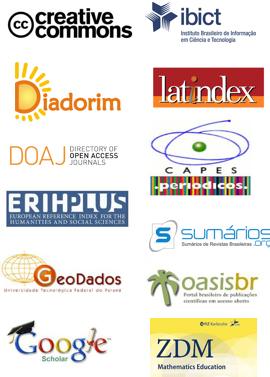Collaborative Work in Mathematics Teacher Education
DOI:
https://doi.org/10.17921/2176-5634.2019v12n3p275-283Resumo
Collaborative work improves teacher education through the interaction between people, narrowing the distance between university and schools and between researchers and preservice or in-service teachers. This systematic literature review included works published in databases like Scielo, ERIC, PsycINFO, Web of Science, and MathEduc. In total, 12 papers were reviewed to identify which factors present in collaborative environments favor the formation of teaching processes in Mathematics Education. The results show that class planning, teaching practices, and knowledge production provide a contribution to mathematics teacher education.
Keywords: Teacher Collaboration. Teacher Education. Mathematics Education. Systematic Review.
Resumo
O trabalho colaborativo potencializa a formação de professores por meio da interação entre pessoas, aproximando a universidade da escola e os pesquisadores dos professores em formação ou já atuantes. Esta revisão sistemática da literatura incluiu trabalhos publicados em bases de dados como Scielo, ERIC, PsycINFO, Web of Science e MathEduc. No total, 12 artigos foram revisados para identificar quais fatores presentes em ambientes colaborativos favorecem a constituição de processos formativos em Educação Matemática. Os resultados mostram que o planejamento de aulas, a prática docente e a produção de conhecimentos contribuem para a formação de professores de matemática.
Palavras-chave: Colaboração entre Professores. Formação de Professores. Educação Matemática. Revisão Sistemática.
Referências
Bednarz, N., Fiorentini, D., & Huang, R. (2011). International Approaches to Professional Development for Mathematics Teachers. Ottawa: University of Ottawa Press.
*Boylan, M. (2010). ‘It’s getting me thinking and I’m an old cynic’: exploring the relational dynamics of mathematics teacher change. Journal of Mathematics Teacher Education, 13 (5), 383-395.
*Costa, M. L. C., & Lins, A. F. (2010). Trabalho colaborativo e utilização das tecnologias da informação e comunicação na formação do professor de Matemática. Educação Matemática Pesquisa, 12 (3), 452-470.
*Cozza, B. (2010). Transforming Teaching into a Collaborative Culture: An Attempt to Create a Professional Development School-University Partnership. The Educational Forum, 74 (3), 227-241.
Crecci, V. M., & Fiorentini, D. (2011, July). Teacher Professionality and Professional Development in Communities of Practice: the case of Collaborative Groups. Proceedings of the International Study Association on Teachers and Teaching (ISATT), Braga, Portugal, 15.
*Cross, S. B., & Bayazit, N. T. (2014). Helping Pre-Service Mathematics Teachers Connect Theory and Practice: using Reading, Writing, and Observation Protocols to Structure Field Experiences. Teacher Education Quarterly, 41 (2), 51-71.
Depaepe, F., Verschaffel, L., & Kelchtermans, G. (2013). Pedagogical content knowledge: a systematic review of the way in which the concept has pervaded mathematics educational research. Teaching and Teacher Education, 34 (1), 12-25.
Hadar, L., & Brody, D. (2010). From isolation to symphonic harmony: Building a professional development community among teacher educators. Teaching and Teacher Education, 26, 1641-1651.
*Healy, L., & Santos, H. F. (2014). Changing perspectives on inclusive mathematics education: Relationships between research and teacher education. Education as Change, 18 (1), 121-136.
Johnson, R. B., & Christensen, L. B. (2004). Educational research: Quantitative, qualitative, and mixed approaches (5th ed.). Boston, MA: Allyn and Bacon.
*Lovin, L. H., Sachez, W. B., Leatham, K. R, Chauvot, J. B., Kastberg, S. E., & Norton, A. H. (2012). Examining Beliefs and Practices of Self and Others: Pivotal points for change and growth for mathematics teacher educators. Studying Teacher Education: A journal of self-study of teacher education practices, 8 (1), 51-68.
Nacarato, A. M., & Grando, R. C. (2008, July). Formative process: sharing learning experiences in Geometry. Proceedings of the International Congress on Mathematical Education (ICME), Monterrey, Mexico, 11.
*Robutti, O., Cusi, A., Clark-Wilson, A., Jaworski, B., Chapman, O., Esteley, C., Goos, M., Isoda, M., & Joubert, M. (2016). ICME international survey on teachers working and learning through collaboration: June 2016. ZDM Mathematics Education, 48 (5), 651-690.
Rowland, T., Huckstep, P., & Thwaites, A. (2005). Elementary Teachers’ Mathematics Subject Knowledge: the Knowledge Quartet and the Case of Naomi. Journal of Mathematics Teacher Education, 8 (3), 255-281.
*Silverman, J., & Clay, E. L. (2009). Online Asynchronous Collaboration in Mathematics Teacher Education and the Development of Mathematical Knowledge for Teaching. The Teacher Educator, 45 (1), 54-73.
*Slavit, D., & Nelson, T. H. (2010). Collaborative teacher inquiry as a tool for building theory on the development and use of rich mathematical tasks. Journal of Mathematics Teacher Education, 13 (3), 201-221.
*Solano, L. A. C., Rico, S. E. P., & Leal, J. E. F. (2017). Reflexiones en comunidad de práctica sobre Triángulos Imposibles en clase de matemáticas. Educação e Pesquisa, 43 (2), 453-466.
*Souza, A. P. G., & Oliveira, R. M. M. A. (2013). Aprendizagem da docência em grupo colaborativo: histórias infantis e matemática. Educação e Pesquisa, 39 (4), 859-874.
Stahnke, R., Schueler, S., & Roesken-Winter, B. (2016). Teachers’ perception, interpretation, and decision-making: a systematic review of empirical mathematics education research. ZDM Mathematics Education, 48, 1-27.
*Strutchens, M., & Martin, W. G. (2013). Making Explicit the Commonalities of MSP Projects: Learning from Doing. The Mathematics Enthusiast, 10 (3), 777-791.


